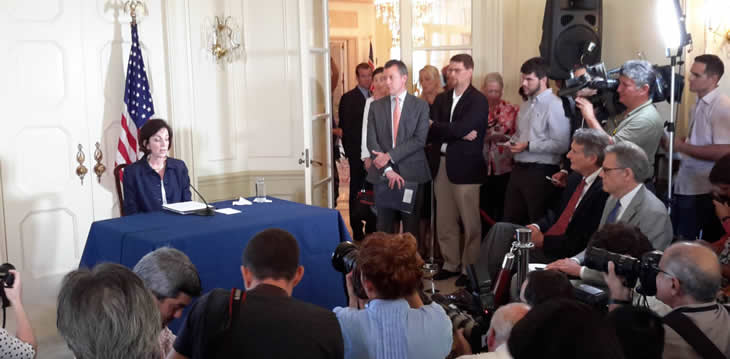
Jacobson’s last public 30 minutes in Cuba
HAVANA — “The road to normalization will be very complex, but the most important thing is to take the first step, which is what we did yesterday.”
Roberta Jacobson has been the head of the U.S. delegation to the round of talks held here toward the reestablishment of diplomatic relations between Cuba and the United States, an agreement reached by the presidents of both nations.
It is the second time she steps on Cuban soil. One before, she participated in one of the 28 migration talks held between the two countries since 1994-95.
Serene and contemplative, the 53-year-old diplomat speaks Spanish fluently, with an accent that shows that she didn’t learn it in Spain but in Latin America. When speaking publicly, she does not banter; in fact, she seldom laughs.
Her last public appearance in Cuba was Friday (Jan. 23) in the small palace in the former Country Club, which has become the residence of the chief of the U.S. Interests Section. It’s a lush building that shows the good taste of its former residents, who were happy to live in a corner of paradise away from the noisy capital.
In the 30 minutes that she faced almost 50 journalists in a room too small for such a crowd, Jacobson, Assistant Secretary of State for Western Hemisphere Affairs, said little beyond what she had expressed previously to the media.
 Her hosts (or maybe she herself) were smart enough to grant the journalists three questions in English and three in Spanish, but they didn’t go much farther than the questions made earlier and reported in the media. One of her aides asked the journalists to make “concise questions, focused on the subject.”
Her hosts (or maybe she herself) were smart enough to grant the journalists three questions in English and three in Spanish, but they didn’t go much farther than the questions made earlier and reported in the media. One of her aides asked the journalists to make “concise questions, focused on the subject.”
“I am very happy to be part of this team,” she said, referring to the delegation created by Obama to begin negotiations with the island’s authorities.
Briefly, she said that earlier on Friday she had met at the residence with sectors of the Cuban opposition and, separately, with members of the Jewish community. Referring to the oppositionists, she said that “it was very important to listen to their opinions and see how in the future we can contribute to the civil society.”
Someone asked how normal conversations could possibly be held while the trade and financial blockade still strangles the island and while Cuba remains on the U.S.-drawn list of nations that sponsor terrorism.
Immutable as always, Jacobson responded that the matter of the blockade (she called it “the embargo”) was a legislative issue before Congress and added that Obama was doing as best he could.
With regard to the list of sponsors of terrorism, she said that, as it is well known, the President has given the State Department instructions to study the case of Cuba to evaluate or review its removal from the list.
Photos: Alejandro Cruz.
Progreso Semanal/ Weekly authorizes the total or partial reproduction of the articles by our journalists, so long as source and author are identified.

